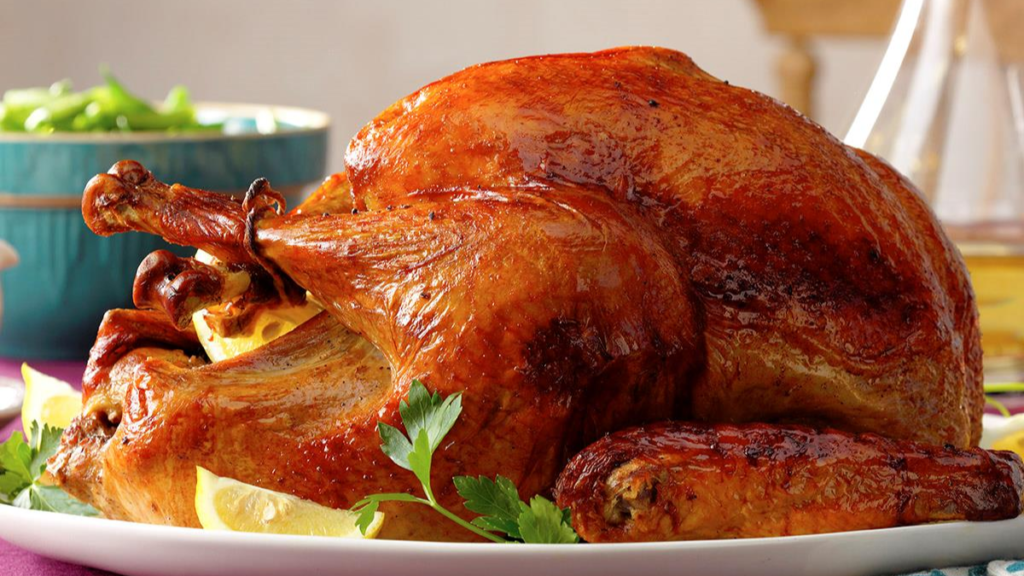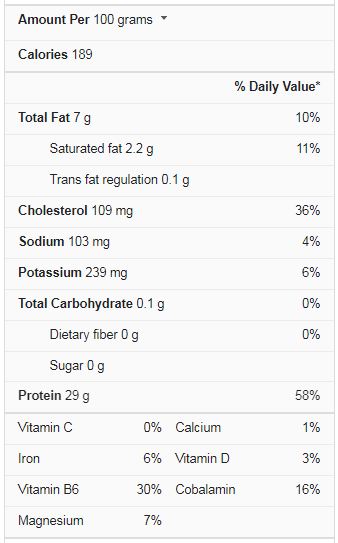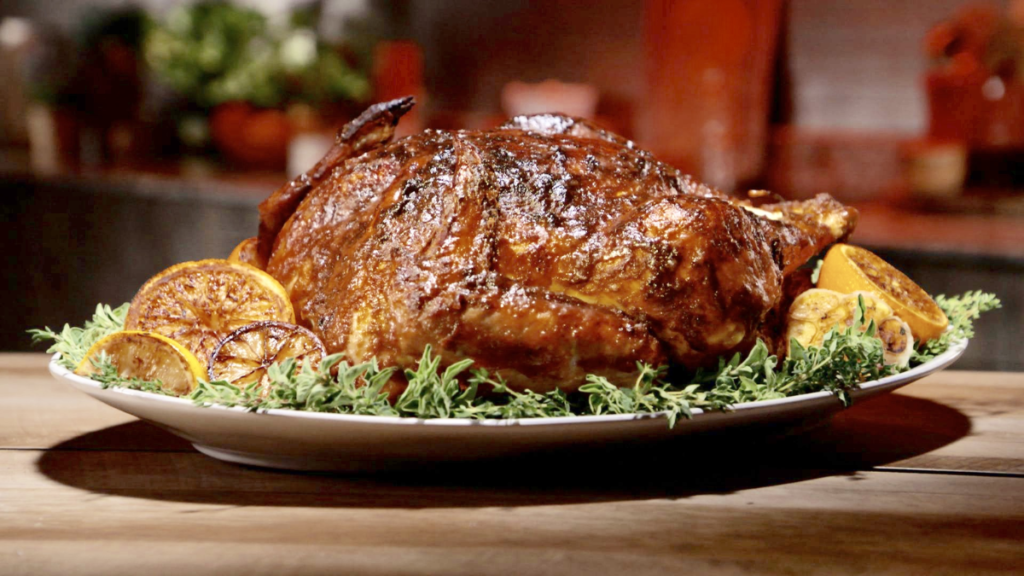You can choose from various flavors and herbs to make a turkey marinade. There are numerous ways to marinate turkey, but one of the most common and delicious is using an herb paste. This marinade is easy to make and only requires about 20 minutes of your time. It is an excellent choice for whole birds and can be marinated overnight. Fresh herbs can also be used for a marinade. Lemon juice and herbs add an aromatic and flavorful taste to the turkey.
One of the finest ways to flavor your turkey is to use a nice marinade. The marinade will easily enter the meat and prevent it from drying out, unlike dry rubs. The skin of a marinated turkey will be golden. This method isn’t just for Thanksgiving; it may also be used on other turkeys. It’s easier than ever to prepare a turkey with the right marinade for your family. You’ll be well on your way to making the ultimate Thanksgiving meal if you’ve perfected the art of turkey marinade.
Turkey Nutrition Facts
What do you Understand by Marinating?
A marinade is a mixture of ingredients used to enhance the flavor and texture of certain meats. Marinades are used in various cuisines and cooking methods worldwide, and the underlying principles are always the same. In one form or another, Marinades can be used with any style of food, but they’re especially good with grilled meats. Kebabs, satays, and tandoori are some of the most popular marinated and grilled meat varieties.
Marinating meat imparts flavor while also assisting in the tenderization of the texture. Acidity is frequently added to marinades, whether from vinegar or citrus juices like lemon juice or enzymes found in mango fruits. This help breaks down the meat’s surface, making it softer and allowing the marinade’s flavors to penetrate deeper.
Salt also has a specific role in a marinade: it removes moisture from the meat, allowing both the lost moisture and the marinade to be absorbed into the meat through a process known as osmosis. This causes the flavors to penetrate deeper into the meat, and using oil can speed up the process even more because oils can convey the flavors of garlic, onions, spices, and herbs.
Why Should you Marinate Meat?
Here are the reasons behind marinating meat:
Flavor
Marinating meat enhances its flavor. How much you marinate your meat depends on your items and how long you marinate it. When it comes to crafting your marinade, the possibilities are nearly unlimited.
Texture
The texture of your meat can also be greatly improved by a proper marinate. The acidity and enzymes break down the meat’s hardness, and the oil and salt help add moisture. As a result, the meat is extremely moist, tender, and flavorful.
The Best Turkey Marinade Recipes
Here are some of the best turkey marinade recipes:
Grilled Turkey Marinade
This simple turkey marinade is ideal for turkey since it complements the bird’s flavor while also providing a protective covering for the grill. This spice blend utilizes Worcestershire sauce, balsamic vinegar, and lemon juice to produce a sour and salty base for a 16-pound chicken. The meat has a subtle flavor from oregano and black pepper. Choose a flavorless oil such as canola, vegetable, or safflower.
Lemon Pepper Marinade
This marinade is especially nice on poultry, such as roasted whole chickens or grilled turkey breasts. The intense flavor of dill and garlic is enhanced by the strength of lemon juice, which tenderizes and flavors the meat. While acid and citrus aid in the breakdown of collagen in the flesh, keep in mind that keeping the fowl in an acidic marinade for too long will result in mushy meat. These marinades are best used for a short length of time.
Deep-Fried Turkey Marinade
When making a deep-fried turkey, you want to infuse it with as much flavor as possible before it goes into the oil. This traditional Cajun marinade tenderizes the turkey while adding flavor. In vegetable oil, dilute white vinegar, tabasco, cayenne, pepper, and Cajun seasoning. Save some of the paste to run between the skin and the meat after rubbing it all over the turkey. When deep-frying a turkey, keep in mind that the oil temperature must be between 350 and 325 degrees Fahrenheit, depending on the size of the bird. Cooking your turkey at the proper temperature prevents it from absorbing too much oil.
Herb Buttermilk Marinated Turkey Breast
This Herb Buttermilk Marinated Turkey Breast is a delectable family favorite because of the ideal balance of herbs and spices. My family, for some reason, dislikes dark flesh on turkey, so the drumsticks, thighs, and wings go to waste. As a result, we’ve only roasted the turkey breast for the past few Thanksgivings, and it’s been a huge hit.
Sun-Dried Tomato Marinade
Starting a marinade with sun-dried tomatoes packed in oil is a terrific way to go. The oil has taken on the flavor of the tomatoes and is ready to be passed on to whatever you want to marinade. This marinade is fantastic on poultry and pork, but it can also be used on fish, veggies, and even cattle cuts.
Jamaican Jerk Marinade
You’ve heard of jerk seasonings and rubs, and our jerk marinade infuses the pork with that delicious jerk flavor. A jerk flavor is typically a paste consisting of spices, garlic, and peppers, but authentic jerk marinades contain Scotch bonnet peppers, so use the spiciest peppers you can find. A thick mixture made of onions, scallions, sugar, spices, peppers, thyme, Jamaican pimiento, nutmeg, cinnamon, oil, and vinegar can be used to marinate any meat. Use for two hours for small slices of turkey and overnight in a resealable bag for an entire bird.
Smoked Turkey Marinade
This 24-hour marinade will please every time, resulting in a moist and tender turkey following the smoking process. Use half of the recipe for chicken and the full recipe for any size turkey. Garlic, olive oil, soy sauce, lemon juice, and mustard are combine with fresh herbs, including chives, sage, and oregano. For the greatest results, this marinade should be left on the meat for a day, and the recipe advocates stuffing the bird cavity with oranges and apples to provide more flavor from the inside.
Honey Mustard Turkey Marinade
This marinade is thick enough to adhere to the turkey’s surface. The paste, made out of oil, lemon juice, coarse mustard, garlic, and honey, will impart a delicate yet distinct flavor to the turkey meat. Coat the turkey inside and out with the marinade in a large resealable bag and set aside to rest for 20 hours, turning it upside down occasionally.
What do you Put in a Marinade?
There are a few essential ingredients to put in a marinade to ensure that it works properly.
Salt
Salt aids in the penetration of the marinade’s flavors into the meat. It works by breaking down some of the structural proteins on the surface of the meat, allowing the marinade’s other flavors to soak in. The meat becomes less tough as a result of the breakdown of proteins. Finally, salt draws moisture from the meat, allowing both the meat fluids and the marinade to be drawn in, enhancing the marinade’s effectiveness. You can use salt alone in your marinade or add salty ingredients like soy sauce. Salt is also great for bringing out the flavors of the other ingredients in your marinade.
Fat
Marinades rely heavily on fats to function properly. Fats help keep the moisture in the meat and prevent it from drying out too quickly. Fats can also infuse the meat with flavors such as onions, garlic, herbs, and spices. Finally, fats help to level out the flavors of a marinade, preventing your meat from being excessively salty or acidic. Different types of oil are common fats to use, but depending on what you’re cooking and the flavors you want to achieve with your marinade, you can also use yogurt or even coconut milk.
Acid
Like salt, acids help break down the proteins found in meat, improving the texture and allowing the marinade to penetrate the flesh more thoroughly. Acids give flavor to a marinade and can also be used to add tanginess and freshness. Lemon juice, vinegar, and even yogurt are some of the most prevalent acidic ingredients in marinades.
Enzymes
Fruit enzymes, which serve the same role as acids, are much more effective in breaking down the proteins in the meat while also adding flavor. Mangoes, pineapples or pineapple juice, papaya, melons, figs, and even ginger are all good examples of fruits used for this purpose.
Herbs and Spices
There are too many options and combinations to list. A marinade’s flavoring can range from fresh, zesty Mediterranean herbs like basil, oregano, thyme, tarragon, or mint to the spicy, heavier flavors found in South Asian cuisine from spices like cumin, coriander, garam masala, and chili. Pepper, tamarind, and mustard are some other choices.
How Long do you Marinate Meat?
This is mostly determined by the type of meat you’re cooking. Some varieties of meat can be marinated for extended periods to improve flavor and texture, while others may begin to break down if left too long. The smaller the pieces of meat, the more the marinade will absorb and the longer it will take to reap the full benefit.
Fish
If you marinate fish or other seafood for an extended period, the meat may get mushy. Most fish should be marinated for little more than 30 minutes to an hour, and smaller portions should be marinated for even less time. This is because a marinade’s acidity may be rather harsh on fragile fish and cause them to break down.
Chicken or Turkey
Large portions of chicken or turkey and smaller bits such as cubes or goujons can be marinated. A marinade is ideal for chicken and turkey because it prevents them from drying out while also providing a lot of flavors. If you’re marinating thighs or drumsticks, you may want to score the meat, which entails making small slices in the meat to allow the marinade to enter deeper. Because the smaller the chicken pieces are, the more marinade they absorb, the cooking durations might vary greatly. Smaller chicken pieces can be marinated for a few hours, while larger pieces, including chicken on the bone, can be marinated for a whole day.
Beef, Pork, Lamb
These red meats are perfect for marinating and can be left in a marinade for 24 hours.
What can I Put in my Turkey for Flavor?
Onion, garlic, thyme, rosemary, and sage are staples for a typical Thanksgiving flavor. Add half lemons or oranges to boost the ante on the aromatics. The citrus will give your turkey a great brightness and acidity.
You can inject a little hot sauce into the turkey before roasting it for an extra fiery flavor. The hot sauce will give a layer of flavor to the meat, which can be extremely excellent. Another approach is to inject spicy sauce into the turkey’s cavity, which will create flavor pockets. This procedure is an excellent substitute for rubbing the bird’s exterior. The marinade will continue to marinate the turkey after it has been cooked.
Conclusion
A nice turkey marinade is simple to prepare and can be used on the whole bird, legs, wings, or tenderloin. An excellent marinade will bring out the flavor of your turkey while also keeping it moist, soft, and tasty. The finest marinade recipe is adaptable to many types of turkey and can be stored in the refrigerator for 90 days. You can marinate the turkey for at least 4 hours if you’re doing it ahead of time.
If you’re using a frozen turkey, it’ll take several days to defrost overnight in the refrigerator. The larger the turkey, the longer it will take to cook, and it takes about five to six hours per pound in the refrigerator. Allow 24 hours for the turkey to fully thaw before bringing it. Depending on how much meat you wish to roast, a 15-pound turkey should be removed from the freezer on a Sunday evening. In addition to using real mayonnaise, rosemary and lemon slices can prevent the turkey breast from sticking and give the roast a delicious scent.



